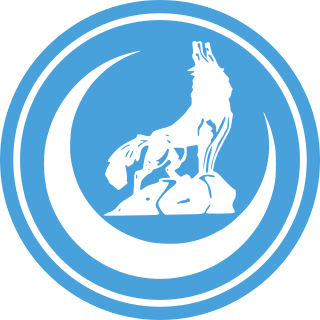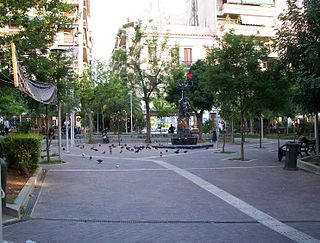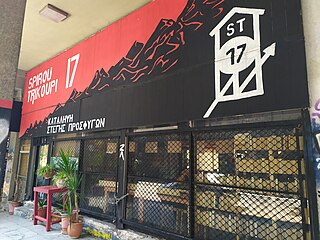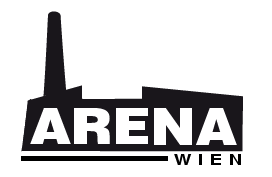

The Ernst-Kirchweger-Haus (EKH) is a self-managed social centre in Vienna's 10th district, Favoriten. It was squatted in 1990 and legalised in 2008. The project is named after Ernst Kirchweger.


The Ernst-Kirchweger-Haus (EKH) is a self-managed social centre in Vienna's 10th district, Favoriten. It was squatted in 1990 and legalised in 2008. The project is named after Ernst Kirchweger.
The building was squatted on 23 June 1990, and became a self-managed social centre, which hosted migrants and refugees, an infoshop, community activities, and political groups. [1] The squatters, who described the EKH as an "international, multi-cultural, anti-fascist centre," named the building after Ernst Kirchweger. He was a former concentration camp inmate and member of the anti-fascist resistance, who was killed in 1965 by a right-wing protester during a demonstration against Taras Borodajkewycz, a former member of the National Socialist German Workers Party. [1]

In 2004, the owner of the house (the Communist Party of Austria, led by Walter Baier) sold the EKH to a real estate company, whose director was accused of being a former right-wing extremist. The residents were threatened with eviction. [1] After a long struggle with many protests and actions, a company with close contacts to the municipality of Vienna bought the building in July 2005. [2] The threat of eviction passed and in 2008, a rental contract was signed. [1]
In June 2020, a feminist demonstration protesting the treatment of women in Austria and Turkey, organised by a Kurdish women’s organisation based at EKH, was attacked by the Turkish far-right group the Grey Wolves. In response, anti-fascists organised a counter-demonstration the next day and this resulted in 200-300 neo-fascists attacking the EKH building, throwing stones, bottles and firebombs. [3] The situation then created a diplomatic war of words between Austria and Turkey, with the Turkish ambassador being invited to the Foreign Ministry. [4]

Squatting is the action of occupying an abandoned or unoccupied area of land or a building, usually residential, that the squatter does not own, rent or otherwise have lawful permission to use. The United Nations estimated in 2003 that there were one billion slum residents and squatters globally. Squatting occurs worldwide and tends to occur when people find empty buildings or land to occupy for housing. It has a long history, broken down by country below.
The WOMBLES were a loosely aligned anarchist and anti-capitalist group based in London. They gained prominence in the early 2000s for wearing white overalls with padding and helmets at May Day protests, mimicking the Italian group Tute Bianche.
The Publixtheatre Caravan is the English name for a travelling project of the Volxtheater Favoriten, a Vienna-based international theatrical troupe that has been creating site-specific theatrical interventions in public space as well as stage-based performances since 1994. It is a political and artistic project that is part of the No Border Network and the Platform for a World Without Racism. It creates critical performance theatre that targets racism, borders, migration control, biometric data collection, and other forms of social control.

The Grey Wolves, officially known by the short name Idealist Hearths, is a Turkish far-right political movement and the youth wing of the Nationalist Movement Party (MHP). Commonly described as ultra-nationalist, neo-fascist, Islamo-nationalist, and racist, it is a youth organization that has been characterized as the MHP's paramilitary or militant wing during the political violence in Turkey. Its members deny its political nature and claim it to be a cultural and educational foundation, as per its full official name: Idealist Clubs Educational and Cultural Foundation.
Taras (von) Borodajkewycz was a former member of the Nazi Party and, after World War II, professor of economic history at the College of World Trade in Vienna. He remained an unrepentant supporter of Nazism after the war and the pro-fascist views he allegedly expressed in his university lectures in the 1960s sparked major student demonstrations in Vienna that resulted in at least one fatality.

Favoriten, the 10th district of Vienna, Austria, is located south of the central districts. It is south of Innere Stadt, Wieden and Margareten. Favoriten is a heavily populated urban area with many residential buildings, but also large recreational areas and parks.

Ernst Kirchweger was the first person to die as a result of political conflict in Austria's Second Republic.

Self-managed social centres in the United Kingdom can be found in squatted, rented, mortgaged and fully owned buildings. These self-managed social centres differ from community centres in that they are self-organised under anti-authoritarian principles and volunteer-run, without any assistance from the state. The largest number have occurred in London from the 1980s onwards, although projects exist in most cities across the UK, linked in a network. Squatted social centres tend to be quickly evicted and therefore some projects deliberately choose a short-term existence, such as A-Spire in Leeds or the Okasional Café in Manchester. Longer term social centres include the 1 in 12 Club in Bradford, the Cowley Club in Brighton and the Sumac Centre in Nottingham, which are co-operatively owned.

Exarcheia is a community in central Athens, Greece close to the historical building of the National Technical University of Athens. Exarcheia took its name from a 19th-century businessman named Exarchos who opened a large general store there. Exarcheia is bordered on the east by Kolonaki and is framed by Patission Street, Panepistimiou Street and Alexandras Avenue. Exarcheia is known for being Athens' historical core of radical political and intellectual activism. Exarcheia is often considered the anarchist quarter of Athens, known for its radical democracy.
The 2009 May Day protests were a series of international protests that took place across Europe, Asia and in the other parts of the world due to the financial crisis of 2007–2008 and the resulting Great Recession. Several May Day marches, which are traditional events, had turned violent in Germany, Turkey and Venezuela as riot police battled protesters in their respective countries. Banks and shops had been attacked in Turkey.
Kirchweger is a German surname. Notable people with the surname include:

In the wake of student protests in Austria since the end of October 2009 against restrictions on the access to higher education, many Austrian universities' lecture halls and rooms were occupied, including the two largest auditoriums in Austria at the University of Vienna.

The Hamburg protests were a large series of demonstrations in Hamburg, Germany, in December 2013 and January 2014.

Rosa Antifa Wien is an Austrian left-wing action group in existence since 1995. Their activists regularly appear at rallies and demonstrations. Their tactics include producing and distributing pamphlets and flyers.

Athens refugee squats exist since the 2015 spike in the European migrant crisis. Greece has been a destination for migrants seeking refuge on the European continent via the "Balkan Route." Coalitions of solidarity groups and migrants have established squats throughout Athens to house refugees, demonstrating an alternative to solutions offered by the European Union and NGOs. The squats are grouped together in the Coordination of Refugee Squats. Notable projects included 5th School and City Plaza. In late 2019, the New Democracy party declared it would evict all the squats.

Klinika was a squatted self-managed social centre in Žižkov, Prague, from 2014 until 2019. It followed in the tradition of anarchist projects such as Ladronka and Milada.

Squatting in Australia usually refers to a person who is not the owner, taking possession of land or an empty house. In 19th century Australian history, a squatter was a settler who occupied a large tract of Aboriginal land in order to graze livestock. At first this was done illegally, later under licence from the Crown.

Arena is a cultural centre in Vienna, Austria. From its 1970s origins in an abandoned former slaughterhouse used for the Vienna Festival, the Arena grew into a centre for alternative culture. It is located at Baumgasse 80 in the Landstraße district.

Ladronka is a homestead situated in a park in Břevnov, Prague 6, in the Czech Republic. Built by Charles IV in 1340, it was bought by an Italian count, then owned by the Sovereign Military Order of Malta before being broken into flats during the communist period. It was then squatted in 1993, becoming an internationally famous anarchist, self-managed social centre. The squatters organised gigs, exhibitions, readings and theatre, before being evicted in 2000 following the anti-globalization protests in Prague. After several years of renovation, Ladronka was re-opened as an activity centre in 2005, serving the surrounding park.

Squatting became a political phenomenon in the Czech Republic after the Velvet Revolution in 1989. Squats in Prague included Sochora, Stary Střešovice and Ladronka. Milada was occupied in 1998 and following its final eviction in 2009, there was a lull in squatting actions. In the 2010s a new social movement squatted houses to highlight the number of derelict properties in Prague and the social centre Klinika was founded in 2014.